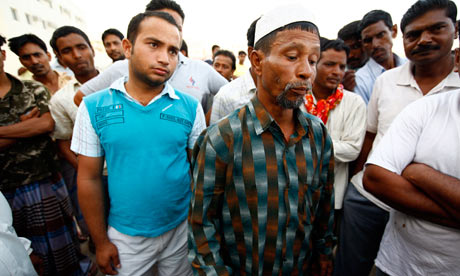Migrant workers ‘left without rights’
Rémi Barroux and Brigitte Perucca, Guardian, Nov 23 2010
Governments are prioritising temporary work that leaves migrants without rights, according to the Council of Global Unions. Its forum on migration this month in Puerto Vallarta, Mexico, agreed a final statement about current “inappropriate policies on immigration in times of crisis”. The global economic crisis has slowed migration, but any recovery in western economies could cause a new wave of economic migrants, together with a more widespread use of short-term contracts. Claire Courteille, of the International Trade Union Confederation, cited a typical programme agreed by Canada and Guatemala: “Under this agreement the authorities of the host country keep the passports of migrants, who are not allowed to contact or even approach trade unions. Nor may they look for other work … they have no rights.”
The council highlighted the “aggressive promotion” of temporary migration programmes, which often depend on middlemen, as between the Gulf states and Asian countries. Workers from Pakistan, the Philippines or Sri Lanka taking jobs in Saudi Arabia, Oman, Kuwait or Bahrain are tied to their employer, and their contract stipulates their place of residence. “Outside this relationship workers have no legal existence, with scope for all sorts of abuse,” said Courteille.
With migrants excluded from welfare systems, “dumping” associated with lack of rights and the tension with locals aggravates problems. “It is hypocritical of governments to take a tough line on immigration and then resort to temporary migration with no safeguards,” says Courteille.
Some progress has been made, however; she cited an agreement between Senegal and Spain that negotiated with trade unions, guaranteeing comparable rights for migrant and national workers.
Jean-Christophe Dumont, of the Organisation for Economic Co-operation and Development, said the issue of migration “has been over-politicised, nationally and internationally, and needs to be addressed more dispassionately”.
This article originally appeared in Le Monde




